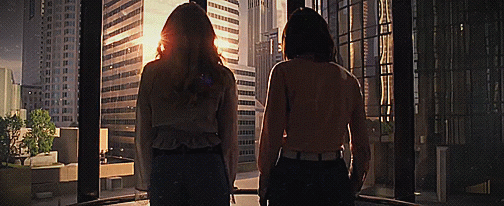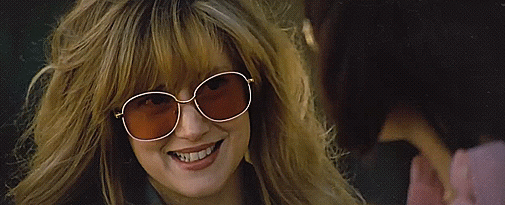Battle of the Sexes, a light but powerful account of the 1973 tennis spectacle between Billie Jean King (Emma Stone) and chauvinist Bobby Riggs (Steve Carell) could easily have been a drag. When King battled and handily defeated the past-his-prime loudmouth Riggs, it was a monumental moment in the advancement of women, not only in sports but in every area they were treated as inferior. But 44 years later, with a sexist blowhard not unlike Riggs in the White House, and women still paid less than men for equal work, that the film is still so timely could be a downer.
Fortunately, it isn't. Battle of the Sexes, with its commitment to vintage period aesthetics and vibrant performances from Stone and Carell, is a real winner that serves up rare insights into the events leading up to the match. In fact, the film is at its best when the lens is tightened on the personal factors that led to King and Riggs' showdown.
King's story begins after she's already a Grand Slam champion, but tired of being offered 1/8th the prize money men receive by the USLTA (United States Lawn and Tennis Association), she bucks the good ol' boys' club and launches, along with World Tennis Magazine founder Gladys Heldman (Sarah Silverman), the Virginia Slims tournament as part of the WTA (Women's Tennis Association). Whether she wanted to or not, King immediately became the face of women's liberation in the realm of female sports, a title that became all the more complicated because of her personal life. While happily married to the angelic, fiercely loyal Larry King (Austin Stowell, and no not the CNN Larry King), she was also beginning to explore her first lesbian relationship with hairdresser Marilyn Bennett (the always-terrific Andrea Riseborough). Keeping it hidden in the closet would be a betrayal of the feminist ideals she espouses, but to reveal it could easily mean the end of her marriage, the end of women's tennis, and a bigger spotlight on the growing media circus.
That circus had the perfect ringmaster in Riggs, a tennis Hall of Famer now in his '50s and bored of being out of the spotlight. A gambling addict with a beautiful, rich wife (Elisabeth Shue, always a welcome presence) tired of his shenanigans and get-rich-quick schemes, he nonetheless is inspired by a random comment to challenge King to a man vs. woman tennis match for big dollars. King flatly denies him for reasons that should be obvious, but her ambitious, homophobic rival Margaret Court (Jessica McNamee) agrees. When she is easily defeated, to the delight of piggish males everywhere, King feels backed into a corner. She agrees to the match, but on her terms.
There are a lot of tennis balls in play for directors Jonathan Dayton and Valerie Faris, who have balanced comedic and dramatic elements to great effect before with Little Miss Sunshine and Ruby Sparks. At times it seems like the screenplay by Simon Beaufoy (Slumdog Millionaire) is unclear of where its energies should be placed. The most interesting storyline by far is Riggs' closeted personal life and the emotional/physical toll it takes on her, which is contrast by her charismatic public persona in which she openly defies powerful sports figures, like sexist tennis legend and commentator Jack Kramer (Bill Pullman). Riggs comes across like a calculated buffoon, and certainly not the pig (He's literally given one as a gift) he portrays himself to be. Played by Carell, Riggs is someone we come to sympathize with, as he too is putting on a brave, if clownish, public face to hide private troubles. Of course, when the guy is on television swatting tennis balls while herding goats, or traveling with a harem of scantily-clad women, he's obviously taking the role of heel to heart. "I'm going to put the show back in chauvinism!", he bellows to an eager crowd. That audience would swell to more than 100 million TV viewers worldwide when the actual game took place, an incredible feat that showed the power television could have on social movements. TV is a visual medium, of course, and the image of Howard Cosell draping his arm creepily over the shoulder of female commentator Rosie Casals (Natalie Morales) while he praises Bobby Riggs...well, it speaks volumes.
The match itself is lovingly recreated and effectively detailed, so that you can almost smell the grass court of the Astrodome. Having watched videos of the match, it's not terribly compelling without the circus atmosphere or the social importance that had been built up. Dayton and Faris capture that feeling, though, so that every shot, every point, has devastating significance.
With her short brunette hair and glasses, Stone resembles King better than one might think. More importantly, she captures King's outwardly enthusiastic persona, which hides her hopes for privacy as she deals with a crumbling marriage and burgeoning homosexuality. Maybe it was all of that time making chauvinism funny in Anchorman, but Carell is a perfect fit for Riggs. Other than Riseborough who provides an elegant counter to Stone, the other supporting performances aren't so great. Despite a few good zingers, Silverman is distracting as the too-slick Heldman, while Alan Cumming is a comical misfire as King's magical Bagger Vance of a stylist, dispensing whispered words of wisdom at every emotional crossroads.
The sexism depicted in Battle of the Sexes is so blatant that it's hard to imagine the world ever worked that way. Well, it still does, just in a more subtle way. Or maybe, considering Mr. "Grab 'em by the pussy" is in the White House, maybe it isn't so subtle. Perhaps we should take the point to be that Billie Jean King's victory was merely a skirmish, and that there are other games still to be won.
Rating: 3.5 out of 5




















